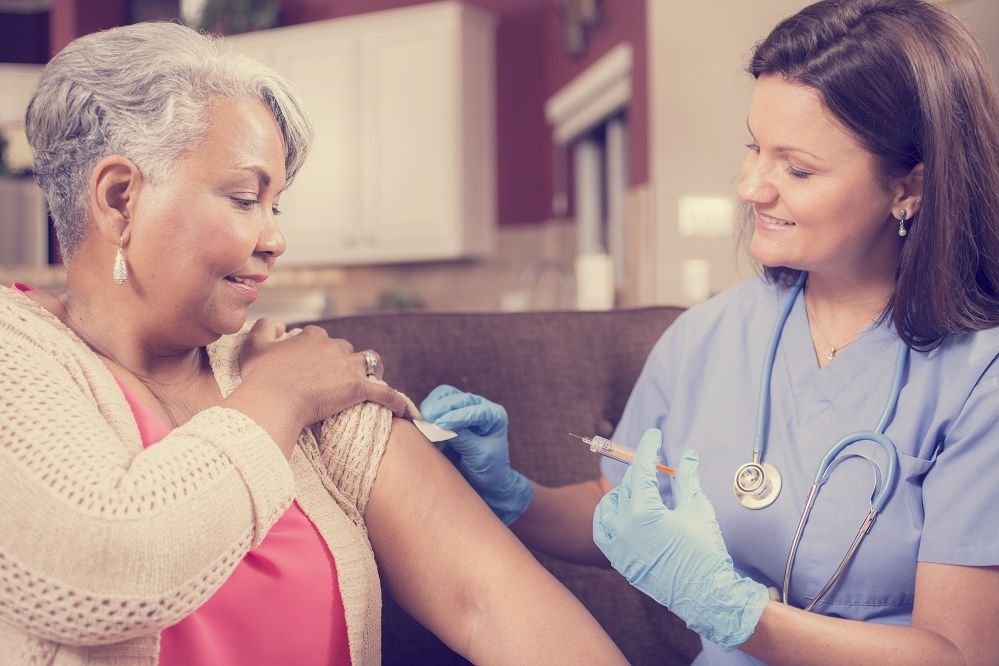Keep one step ahead of the flu
Older Australians are eligible for free vaccination against the flu and there are good reasons for you to get the jab now.

As we age, our immune system naturally becomes weaker. It can make us more likely to get sick from diseases such as COVID-19 and influenza (flu).
These diseases can lead to serious health complications, including longer recovery times, the need for hospital care, and even death. For those living in aged care homes, shared living arrangements also means infections can spread quicker.
The Department of Aged Care has launched a campaign urging older Australians and their families to stay alert for the flu and other infections - and to take steps to prevent them and seek timely treatment:
If you live in an aged care home or are receiving treatment in your own home, then no matter how unwell you feel, even if it’s mild, you should tell your aged care or healthcare worker.
You can be tested for symptoms of COVID-19 with a Rapid Antigen Test (RAT) or polymerase chain reaction test (PCR).
It's important to see your doctor if you have COVID-19, as older people are at greater risk of getting very unwell.
You should wear a mask when a worker is at your home or in your room.
You will be supported and cared for, even if you have COVID-19 or the flu.
Vaccination is a safe and effective way to protect yourself, your family, and others in the community from a respiratory infection.
Regular vaccination is the best way to reduce your risk of serious illness, hospitalisation, or death from infectious respiratory diseases such as COVID-19 and flu.
If it has been six months since you’ve had a COVID-19 vaccination, a booster:
Is recommended for people 75 or older
Can be taken by people aged 65 to 74 years, following discussion with your healthcare provider.
Flu vaccinations are recommended annually. COVID-19 and flu vaccines are available free to people 65 and over and they can be taken together.
You can access vaccinations through your:
GP or pharmacist
Community health centre or Aboriginal health service.
If you live in an aged care home, your provider is responsible for making vaccinations available.
Click here to find a clinic and book your vaccination.
COVID-19 oral antiviral treatments are available to people aged 70 and over. You need to start this treatment within five days of symptoms starting or testing positive for COVID-19.
Early assessment is essential. Talk to your GP or nurse practitioner to find out whether the antiviral treatments are right for you before testing positive to COVID-19.
Seeing your family, friends, carers, and loved ones is important for your mental, social, physical, and emotional wellbeing.
The Industry Code for Visiting Residential Aged Care Homes means aged care residents can have visitors while minimising the risk of spreading infection.
Whether you have visitors at your aged care home or in your home, you should ask visitors to:
Only visit when they are well
Wash their hands before entering your home or room
Practice good hand hygiene.
If you or your visitors are unwell, you can also use phone and video calls to stay in touch with your community.
There are also supports and things you can do to help your mental health.
Talk to your GP, pharmacist, nurse practitioner, contact Healthdirect, or call 1800 022 222, if you want to talk to someone about COVID-19 and flu impacts.
If you have concerns about your aged care service, please raise them with your provider first.
If you can’t resolve your concern, you can:
Call the Aged Care Quality and Safety Commission on 1800 951 822
Get support from a free Older Persons Advocacy Network (OPAN) advocate on 1800 700 600
Find someone to help you through the National Disability Advocacy Program (NDAP) or the call the National Dementia Helpline on 1800 100 500.
If you need an interpreter, call the Translation and Interpreting Service on 131 450.
For the latest advice on aged care services subscribe to the Department of Health and Aged Care’s EngAged newsletter.
You can also contact local state and territory health departments.





